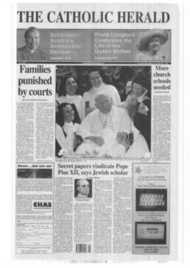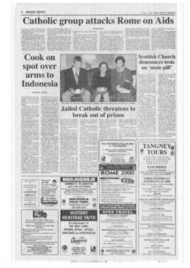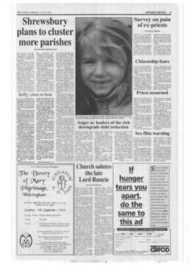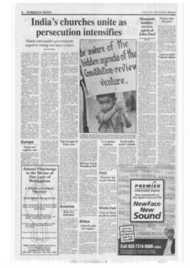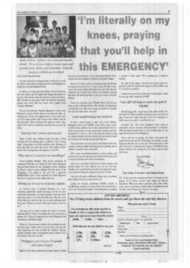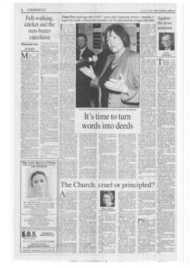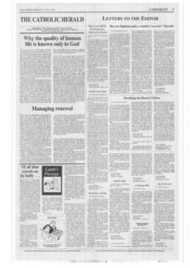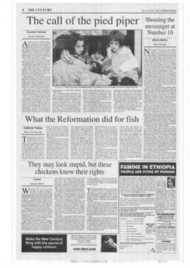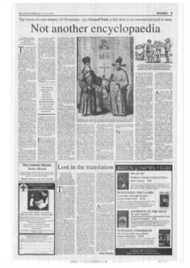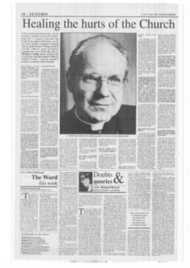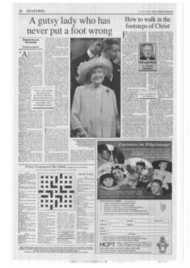Page 1, 21st July 2000
Page 1

Report an error
Noticed an error on this page?If you've noticed an error in this article please click here to report it.
Tags
Share
Related articles
Vatican Attacked Over Archives
Justice To The Memory Of Pius Xii
Pope Benedict Defends Role Of Wartime Pontiff
Papal Trip To Avoid Holocaust Museum
Release Of Secret Vatican Archives Vindicates Pius Xii
Secret papers vindicate Pope Pius XII, says Jewish scholar
By Simon Caldwell A prominent Jewish historian has defended the role of the wartime pope — who has been posthumously accused of silence in the face of the Holocaust.
Professor Richard Breitman is the only member of the American public to have had authorised access to classified United States secret service documents on the Second World War and which refer to the role of Pope Pius XII and the Nazi attitudes toward him.
Prof Breitman of American University in Washington, a member of the working group for the restitution of Jewish property, which was given sole access to the documents, has now made claims in support of evidence to suggest that Pius's conduct toward the Jews of Rome was heroic.
He said many Italian Jews were hidden in the Vatican by Pius, whom, he said, was distrusted by Hitler, who knew of his activities in helping the hunted to make their escapes.
In an interview with the Italian newspaper, Corriere della Serra, Prof Breitman said that what "impressed" him the most about the papers was the Nazi hostility toward the Pope.
"In general, the Germans considered the Pope as an enemy," said Prof Breitman. "In a telegram, someone suggested to play on his old anti-communism, to induce him to 'understand' Nazism, and to take him from Rome to the north: the Vatican and Germany would have formed a common front against the USSR, and the Vatican would fall under Berlin's control.
"But the proposal was rejected because the majority knew that Pius XII would never leave Rome, and that the Vatican was on the side of the Allies."
He added: "The Nazis had spies in the Vatican. Among their dispatches deciphered by our espionage one spoke of an Allied plan to disembark in Sardinia, another of the departure of a diplomatic train with Jews on board, transported from Rome to Spain.
"Only the Vatican was upto-date, the Nazi 'moles' told General Karl Wolff, SS chief in Italy. Berlin distrusted the Pope and the Vatican, because it knew they hid Jews."
He described the dossier as the "tip of the iceberg", adding that millions of pages are expected to be made public over the next three years. Prof Breitman said he was also "impressed" by the Nazi's September 1943 plan to "Germanise" Italy and added that he found the Allied silence on the Holocaust "surprising".
Claims of the so-called "silence of Pius XII", who died in 1958, first arose in the 1963 play Der Stellvertreter (The Vicar) by Ralph Hochhuth, son of a German wartime army officer who insinuated Pius was a coward and a secret Nazi concerned only about his alleged investments in Germany.
Last year, similar charges against Pius were made by British author John Cornwell in his book, Hitler's Pope, which was condemned by the Vatican as "shameful lies".
Nevertheless, the publication of the book led to an outcry by some Jewish groups and the case for the planned beatification of Pius was put on ice by Rome in order to maintain its treasured good relations with the Jews.
Criticisms of Pius gained momentum since his death, though, ironically, after the war he was held up as a hero by many European Jews. One of them, Israel Zolli, the Chief Rabbi of Rome during the Second World War, was so impressed by his conduct that he converted to Catholicism and took as his confirmation name Eugenio after Pius, who was baptised Eugenio Pascelli.
Much criticism hinged on the fact that during his wartime statements, Pius XII, unlike his predecessor, Pius XI, failed to condemn the Nazi regime specifically by name, though he repeatedly condemned racial persecution.
Many believe Pius erred on the side of caution in the wake of the experience of the Dutch bishops whose decision in 1942 to read out a letter of protest against the Nazi persecution of the Jews led to deportation in Holland being accelerated.
Instead, Pius ordered 155 Italian Catholic religious houses, parishes and seminaries to shelter and hide Jews fleeing persecution. This move alone is believed to have saved a total of 4,447 lives.
Among Pius's apologists was Emile Pinchas Lapide,a Jewish diplomat and a critic of the papacy, who estimated in his book, Three Popes and the Jews, that "Pius XII, the Holy See, the Vatican's nuncios and the whole Catholic Church saved between 700,000 and 850,000 Jews from certain death (under the Nazis)".
Albert Einstein was another Jew who acknowledged the role of the Church, praising it for standing "squarely across Hitler's campaign for suppressing truth".
Writing in Time magazine in 1940, he said: "I had never any special interest in the Church before but now I feel a great affection and admiration because the Church alone has had the courage and persistence to stand for intellectual truth and moral freedom. I am forced to thus confess that what I once despised, I now praise unreservedly."
blog comments powered by Disqus


